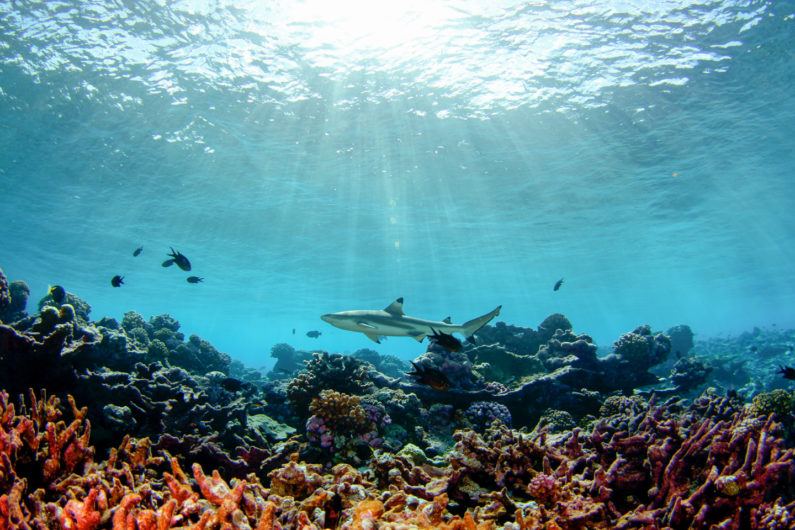
Black tip shark swims above a shallow reef of primarily dead coral skeletons at Palmyra Atoll. Image credit: Brian Zgliczynski Photo by Brian Zgliczynski, Scripps Institution of Oceanography
Justin Rogers, a postdoctoral researcher at Stanford’s Environmental Fluid Mechanics Laboratory, has just published the results of his important research on how climate change has been and will affect reef ecosystems. His study focuses on how ocean water circulation – both water flow and wave dynamics – affects reef temperatures and stability, and therefore, overall health. For three years, he and his team recorded data from the temperature sensors, velocity sensors to track wave speed, and pressure sensors to measure the strength of incoming waves and tides that they deployed in the waters surrounding the South Pacific atoll of Palmyra.
From the Stanford News: “The reefs that did best over time – those showing the highest level of live coral cover – were the ones that received an ample flow of cooler water from the ocean further offshore. The team found that both waves and tides in nearby waters drive the flow rate around these high-performing reefs, with waves being the most significant factor.
“High temperature is very stressful to corals,” Rogers said. “If there’s not enough exchange of water from the open ocean, those areas do not do well.”
Not surprisingly, in reef zones around the atoll that had less moving water, coral cover was much sparser, since there was little cool inflow to offset rising water temperatures.
The researchers also found that coral health suffered when there was high wave stress around the outer edges of reefs – heavy pounding that inflicts physical damage. High wave stress may become more common as climate change proceeds and sea levels rise. Conversely, protected reefs subject to less intense pounding had higher levels of healthy coral cover.
Rogers’ study suggests how coral die-offs in other, similar reefs may proceed if global ocean temperatures continue to rise. A 2016 U.S. government-funded study reports that oceans are already warming worldwide at an unprecedented rate. If this trend continues, more coral reefs will sicken or die, threatening fisheries in coastal areas and throwing undersea ecosystems off balance.
Reefs in stagnating water zones and those exposed to heavy wave pounding may be among the first to go. “Areas of the reef that are not stressed will suddenly become stressed,” Rogers said. Corals can withstand brief water temperature fluctuations, he added, but their resistance wanes when average temperatures remain high for weeks or months at a time, as they do in areas with low ocean inflow. “What really seems to affect corals are these long-term temperature changes. They create an environment where it’s difficult for the corals to thrive,” he said.
While the prognosis may be grim, Rogers’ findings also suggest practical strategies to salvage as many reefs as possible. “At a local reef scale, we could look at promoting flow in some areas,” he said, though he cautioned that such interventions would have to be vetted carefully to avoid unintended adverse consequences.”










0 Comments